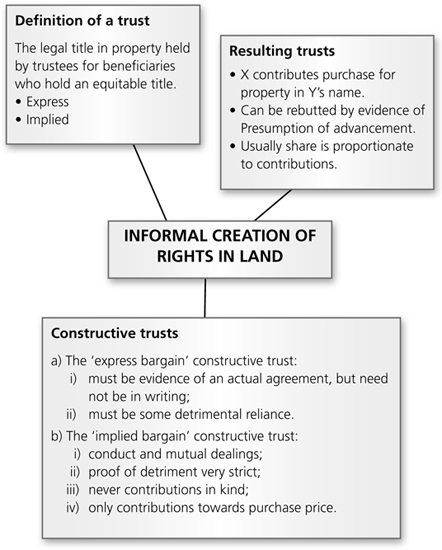Informal creation of rights in land
Informal Creation of Rights in Land

5.1 Implied Trusts
5.1.1 The Definition of a Trust
1. A trust allows ownership in property to be split between legal and equitable ownership.
2. A trust arises whenever two or more persons have rights in land.
3. The legal title to property is held by one or more persons (the trustees) but not exceeding four.
4. The beneficiaries are entitled to the equitable title.
5. The trustee holds on behalf of the beneficiaries who take the benefit of the trust.
6. Trusts are split into two categories:
 the express trust based on the declared intentions of the parties; and
the express trust based on the declared intentions of the parties; and
 the implied trust, either based on the presumed intentions of the parties or imposed by the court to give effect to informal bargains.
the implied trust, either based on the presumed intentions of the parties or imposed by the court to give effect to informal bargains.
5.1.2 The Express Trust
1. The settlor asks trustees expressly to hold property on trust for beneficiaries X and Y on terms named by the settlor.
2. The presumption of joint ownership would not apply if property was purchased as an investment even if the owners were members of the same family. It would be more appropriate to find a resulting trust and to apportion shares according to the value of each contribution.
3. Alternatively, the owner of property declares himself to be trustee of the land on behalf of X, the beneficiary.
4. The creation of the trust must comply with s53(1)(b) LPA 1925, which requires evidence in writing. Without written evidence the trust is unenforceable.
5. The trustee is under a duty under common law and the Trustee Acts 1925, 2000, to act in the best interests of the beneficiaries and according to the settlor’s instructions.
6. The beneficiaries have the right to compel the trustees to carry out the terms of the trust.
5.1.3 The Implied Trust
1. In land law today the vast majority of trusts arise by implication.
2. The court will impose an implied trust where it decides to give effect to the presumed intention or informal bargains of the parties.
3. Implied trusts do not require any formalities (LPA 1925 s53(2)).
4. In some cases the courts may find an implied trust where the formalities of an express trust have not been complied with by the parties.
5. There are two types of implied trust:
 the resulting trust; and
the resulting trust; and
 the constructive trust.
the constructive trust.
5.2 Resulting Trusts
5.2.1 Definition of Resulting Trusts
1. A money contribution towards the purchase of a legal estate in the name of another will create the presumption of a resulting trust.
For example:
a) X provides £60,000 for the purchase of Whiteacre in Y’s name. Y holds on resulting trust for X.
b) X and Y each provide £60,000 for the purchase of Blackacre in the name of Y. Y holds on resulting trust for X and Y.
2. A resulting trust can arise where the parties are unaware that a trust has been imposed.
3. This can be rebutted by evidence that the money was meant as a gift or a loan, or there is a presumption of advancement.
4. In some circumstances the relationship of the parties will allow the presumption of a gift.
5. A gift will be presumed between father and child (Dyer v Dyer (1788)), but not mother and child, and between husband and wife.
6. a) X provides £60,000 for the purchase of Whiteacre in Y’s name. Y holds Whiteacre on resulting trust for X.
7. The presumption of advancement can be rebutted by evidence that no gift was intended.
5.2.2 The Operation of Resulting Trusts
1. A resulting trust can be implied where there is a direct cash contribution to the purchase price (Cowcher v Cowcher (1972)).